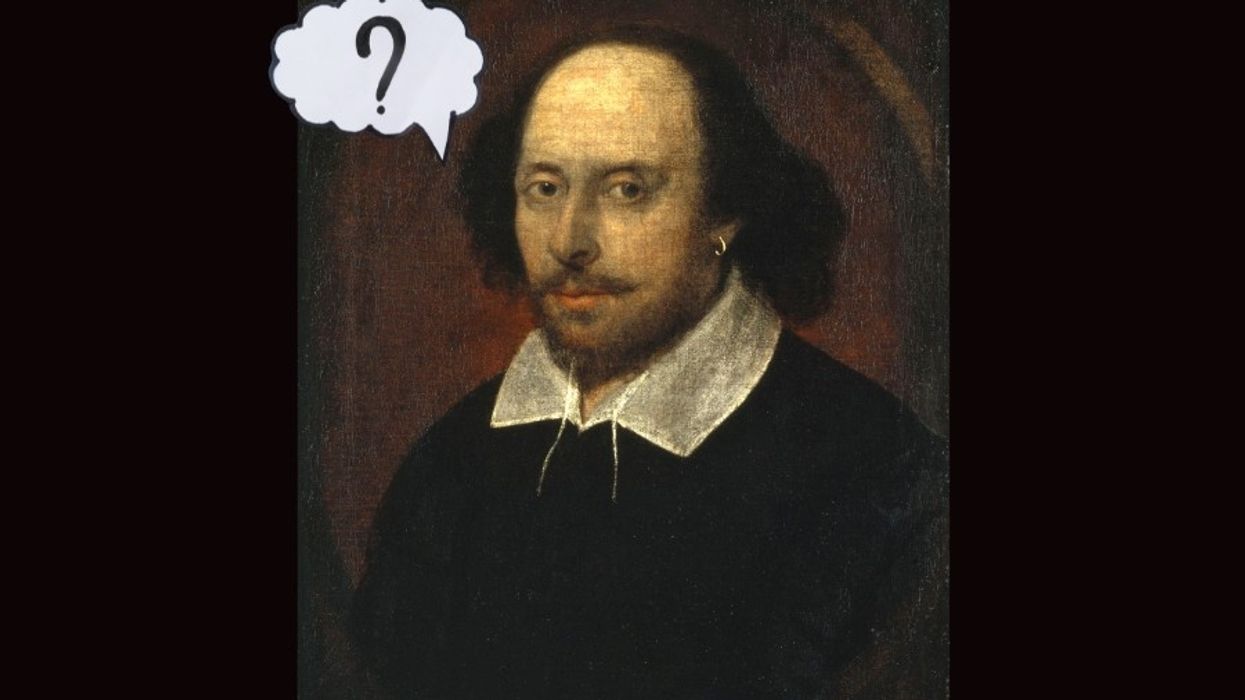When we first encounter the endlessly celebrated works of William Shakespeare, many of us—at least those who are willing to admit it—walk away bored and/or befuddled. And part of that frustration probably comes down to a language barrier. After all, his work was published in the late 1500s and early 1600s, and English has evolved considerably in the subsequent centuries. Perhaps if they could untangle some of that linguistic confusion, the naysayers would at least appreciate The Bard a bit more. In a massively viewed video, NativLang dug into the evolution that informed Shakespeare's writing, prompted by one intriguing question: How did his English actually sound back then?
The YouTuber starts with their own story, admitting they "never really got into Shakespeare" and used to be annoyed during theatrical productions in school. "As the theater geeks donned their British accents," they narrate, "a random gadfly sneered: 'Heh, you know what Shakespeare really sounded like? He sounded like us.’" Through some "linguistic detective work," they leap from Shakespeare's strange spelling back through the centuries—moving from Chaucer to "the spelling debates" by scholars like John Hart and William Bullokar in the 1500s and 1600s, leading to the evolution of words like "knight" and "correction."
- YouTube www.youtube.com
Lost puns and other "raisins" for confusion
This led to the "Great Vowel Shift," which ultimately birthed Shakespeare’s tongue: "Early Modern English." At that point, numerous words were pronounced differently, which results in rhymes that no longer hold up to a modern speaker. For example: "One," at that point, rhymed with "alone." "Reason" sounded more like "raisin." There are even potential puns that don’t survive today: "If reasons were as plentiful as blackberries, I would give no man a reason upon compulsion, I." (On the latter front, be sure to check out Nathan Fielder’s hilarious lost comedy sketch called "The General’s Raisins": a perfectly dumb work of art based solely around the pronunciation of "reasons" as "raisins.") The NativLang video also explores how dialects and grammar influenced Shakespeare’s use of language.
- YouTube www.youtube.com
Celebrating Shakespeare's Work Authentically
In 2004, linguist David Crystal helped spearhead the first productions of Shakespeare’s plays in Original Pronunciation (OP), dedicated to the phonetics of Early Modern English. "Playgoers detected suspicious traces of one particular dialect: their own," NativLang says. "There’s something universal about learning to pronounce. We all come as strangers to Shakespeare’s sounds."
In a 2016 interview with Exeunt Magazine, Crystal elaborated on how audiences have responded to these productions. "What I find most fascinating about OP is the way audiences everywhere (I’ve seen about 15 plays done in OP around the world to date) report that OP gives them a sense of ownership that the tradition of presenting the plays in RP (Received Pronunciation—as heard from Olivier, et al) did not," he said. "The reason is that OP contains echoes of their own speech. Virtually everyone says, after listening to OP, ‘we speak like that where I come from.' What they’re noticing are the sounds in OP that are closest to their own backgrounds. The closeness makes them more receptive, and thus a second comment is also common (including those who speak English as a second language): the plays become easier to understand."
- YouTube www.youtube.com


















 Revenge can feel easier than forgiveness, which often brings sadness or anxiety.
Revenge can feel easier than forgiveness, which often brings sadness or anxiety. 
 Created with
Created with  Where to turn off autoplay in your account on Facebook’s website.Screen capture by The Conversation,
Where to turn off autoplay in your account on Facebook’s website.Screen capture by The Conversation, 
 A young teen cries while listening to music via
A young teen cries while listening to music via 
 A young couple waits in line at a coffee shopCanva
A young couple waits in line at a coffee shopCanva Gif of Eddie Murphy telling you to think
Gif of Eddie Murphy telling you to think


 Volunteers who drive homeless people to shelters talk with a person from Ukraine in Berlin on Jan. 7, 2026.
Volunteers who drive homeless people to shelters talk with a person from Ukraine in Berlin on Jan. 7, 2026.